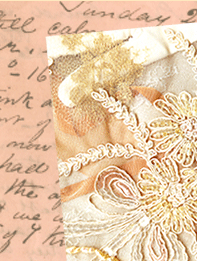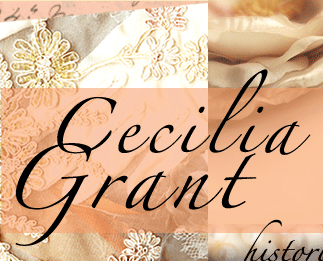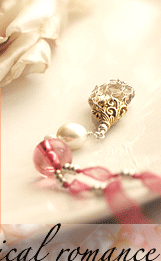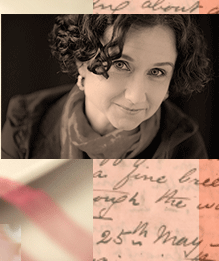

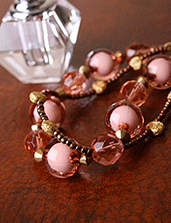

A Christmas Gone Perfectly Wrong
Excerpt

The trouble, Andrew Blackshear would later reflect, might all have been avoided if he'd simply kept to the main road. His first glimpse of the girl would then have been indoors, seated, with her hair bound tidily back, and their first dialogue would have been an inquisition so tedious as to temper the allure of those great swooping clean-edged curves that made up her prodigal mouth.
But with no way of knowing what lay in store, he hadn't any reason to avoid the detour. The clouds broke above him, he turned down a lane whose towering yews promised a bit of shelter, and trouble found him, in torrents that put the winter squall to shame.
December 1807
"Might you like to go back inside, and I'll take the ribbons?" John Coachman flexed his leather-clad fingers. Two minutes more, maybe three, and he'd be grabbing the reins without asking. His silent disapproval of this yew-lane digression grew more evident by the furlong.
"Not necessary. We ought to be hard by the place now. And if I'm inside, I won't have the proper view to know when we're upon it." With one hand Andrew jammed his hat more securely down. The parallel ranks of trees funneled wind straight up the lane, driving rain into his face. Droplets zigzagged down his cheeks, joining forces to form pea-sized beads of water that dripped off his chin or negotiated the angles of his jaw to go rolling right under his cravat. Miserable sensation, things getting under one's cravat. He swiped at his chin with the back of his glove.
"If you was to tell me what sort of marker you're looking out for, then I suppose I could look out for that same thing. And you could go back inside and keep dry." A sodden leaf pinwheeled into the coachman's face and stuck there. He let it remain, as though to make a show of his fitness for withstanding such out-of-door vagaries.
"I assure you there's no point. Indeed there can be no question at this juncture of keeping dry. I'd only drip water on the seats. I'm sure you recall what trouble it was to persuade my father to the expense of new leather, and I trust you can imagine what would be his reaction if—oh, good Lord, what does this nickninny think he's about?" Striding right down the center of the lane ahead of them, apparently without the wits to make for the cover of the yews, was a tall figure in a hooded cloak.
"It's a woman, I think." The man leaned forward and squinted as they gained on the figure. "Leastwise it's in skirts."
That it was. On sustained inspection one could see a wet flapping hem beneath the wet flapping cloak, though really, nothing else about the person proclaimed femininity. Certainly not her walk, bold and loose-jointed as a triumphant racehorse on its way back to the paddock. With her face turned away, and her form swathed in the shapeless cloak, anyone might mistake a figure of such stature and stride for a man.
"What's she doing in the middle of the road? She'll get herself soaked to the skin if she doesn't get run down by a carriage first." One side of her cloak gusted up and back, mud-spattered skirts swirling along with it. For a second, some two or three inches of black-stockinged leg flashed above her coursing half-boots. Reflexively, Andrew glanced away.
"Might be as she's one of them idiots. Not right in the head. I don't doubt they're common out here." John Coachman lowered his voice, though the woman was still too far ahead to hear.
"Then she ought not to be out on her own at all. People should take more care." People never did, though. That was the trouble. People let their idiot or impetuous womenfolk go traipsing afield at will, never mind the dangers of lightning storms, runaway carts, encounters with strange unscrupulous men on the road.
"Might be as she can tell you where to find your manor house, idiot or no."
"I'm entirely capable of navigating to this place without imposing my conversation on a female to whom I have not been introduced." Deuce take it. Deep in the wilds of Norfolk he might be, but that didn't mean he must give in to whatever lax standards of decorum prevailed here. Rather he would set them all the example of how civilized people behaved.
Lord knows he had enough practice in setting such examples. Among the rakes-in-training at Cambridge, for the younger Blackshear brothers and sisters deprived of a steady parental presence, he'd made it his business to demonstrate, always, the proper conduct of a gentleman. So could he now do for this girl—not that he'd deliberately taken note of her age, but by the vigor of her ambulation, and the shapely bit of leg he'd not been able to avoid glimpsing, girl did seem the accurate identifier; she was surely no matron—at all events he would show her, by passing her with a nod and no remark, just how a decent man should be expected to—
She turned, a lash of wind snatching her hood from her grasp and throwing it back to expose her, and the question of what a decent man would do went spinning off like another wet leaf in the storm.
Shock sparked at the nape of his neck, followed by a faint, irrational prickling of shame, and an impulse to avert his eyes.
Not only did the girl wear no hat or bonnet, but her hair—pitch-dark masses of it—fell straight down, unbound and ungoverned, for some scandalous number of inches before it disappeared into the collar of her cloak.
His hands tightened on the reins. No woman, not even a sister, had ever appeared before him with her hair undone. It was one of those intimacies a gentleman looked forward to enjoying after his wedding, or upon taking a lover, if he were the sort of man to do that. It wasn't an experience one expected to encounter on a mundane afternoon on a road in the hinterlands of Norfolk.
He disapproved. He disapproved altogether of this girl, who made not the slightest attempt to cover her head again but merely backed to the yew-edge of the lane to let him pass, the wind now tugging at this or that lock of hair and threatening to spring one free and unfurl it stark as a mourning ribbon on the winter air.
Andrew swallowed. He'd stopped the horses, it seemed, when he'd come up alongside her, and now sat stupidly under her calm, curious, unashamed gaze. Why had he done that? Did he intend to sit here and ogle her hair, hoping the wind might succeed in liberating a piece for his more thorough inspection before the rain plastered the whole of it to her head?
A nearby sound intruded on his stupid trance: beside him, John Coachman was clearing his throat and sending a hand, slowly, toward his hat.
Right. Of course. Hat. Andrew caught at his own. Regardless of his reason for stopping, he'd stopped. He'd be polite now, and regain his scattered thoughts and his dignity both. "Pardon me. Good day." Would you be so good as to direct me to the manor house at Mosscroft? "Is there somewhere I can convey you? It's a dreadful day to be out on foot." Heat surged from his cheeks right up to his hairline as the appalling, unaccountable words spilled from his tongue.
The girl's eyes flicked from him to the carriage and her mouth tightened, lips rolling inward a fraction of an inch.
Lord, her mouth. Her mouth was a sinning man's fever dream.
What the devil was wrong with him? Could one glimpse—well, one sustained and continuing view—of undressed hair really strip him so easily of all the civility and self-command that made up his better being?
No more of this nonsense about mouths and sin. "Forgive my being forward." That was more the thing. "I assure you I mean nothing improper." He forced his gaze to his hat, which he'd foolishly turned upside-down on his knee and which was on its way to being sodden on the inside. He flipped it over. "Only it's such a day, and I couldn't help... that is, you'd have the carriage entirely to yourself, as I need to stay here on the box..." Worse and worse. He sounded like some duplicitous fellow in a Gothic novel, all chivalrous propriety until the instant the carriage door clicked shut and he could crack his whip and go thundering away with her to his bleak remote castle. "Deuce take it. I don't make a habit of addressing young women without a proper introduction, I promise." He risked a sideways look at her. "I've offended you, I fear."
She shook her head and smiled, a sling-shot of a smile that struck him dead center in the chest and knocked out a little of his breath. "Not at all. You're kind to offer." Her accent was good, not so raw and rangy as her demeanor might lead one to expect. "And I trust you won't be offended if I decline."
"Oh, no, no. I understand." Indeed her refusal was for the best. If she'd accepted his offer, he'd have had to worry over what other strange men's carriages she might heedlessly climb into. Now he could go on his way, resting easy in the knowledge that she had some prudent good sense, whatever the state of her hair.
Another hard gust sent her cloak and skirts churning. Her hand darted across to catch the unruly garments and cover herself, even while the wind-driven cloth outlined her proportions. He couldn't help noting the placement of her waist, her hip, set such a way up her height as to indicate wondrous long legs. A veritable Thoroughbred of a woman she was: if he jumped to the ground she might nearly look him in the eye, and he was not a man of modest stature.
Was there any plausible reason for him to jump to the ground? Could he do so without looking as though he had sinister intentions?
John cleared his throat again, this time wiping the rain from his face and the leaf along with it.
Yes. Right. Enough of this foolishness. The rain was falling hard as ever and he had somewhere to be. No doubt she did as well. He swiped at his own face, then gave his hat a shake and put it back on. "Be careful walking, won't you?" He nodded at the girl. "In rain like this it's difficult for a driver to see you, and the wind might prevent you hearing a cart's approach. I should stay to the side." Much better. Indeed, this was precisely what he'd meant to say in the first place, before he'd been so dismantled by the sight of her hair, and her mouth, and the suggestion of Amazonian limbs.
"Of course. Thank you." She dipped her chin, inducing a slight rearrangement of her hair at the collar of her cloak, and he caught up the reins and flicked them with brisk authority, as befit a gentleman who took no unseemly notice of the state of a woman's hair. And only after he'd driven off did he realize he'd forgot to ask the way to Mosscroft.
No matter. Five more minutes and he saw it through the trees, a plain blockish red-brick manor with five chimneys, half a dozen dormer windows, and ivy crawling all up the western side, exactly the way Livingston had described it.
He's a bit eccentric, his friend had said. Prone to go on about his family's connection to Hume or Hobbes or one of those fellows. Takes his time getting round to the business of your visit. But you won't find better falcons anywhere in the east of England.
Livingston, to be sure, was a liberal-minded sort, willing to tolerate a good deal of nonsense if a fine hound or horse or fowling piece lay at the other side of it. Probably he hadn't once been troubled, while doing his own business here, by the notion of a baron neglecting his place in Parliament to stay out in the country fooling about with birds.
"I expect the birds spend much of their time in some sort of shelter during winter?" Andrew glanced at the mantelpiece clock. Twenty minutes now he'd been sitting in the man's drawing room, and Lord Sharp had not yet proposed to show the falcons, though he had indeed dropped a mention of Hume. "I'm sure I look forward to seeing the particulars of how they're kept and trained." In fact he had no interest whatsoever in any aspect of falconry, but if feigning such interest could move his errand along, then feign he would, with an untroubled conscience.
"They stay in a proper mews in such weather, you may be sure. I've never yet lost a bird to disease." Sharp swung one long leg over the other and appeared to settle more firmly into his armchair. "But I should have thought your sister would like to come along, since she is to be the huntress. A person usually likes to select his own bird, or hers." With an air of profundity he tapped two fingers against his thick gray side-whiskers. "It's not unlike a marriage, the partnership. All the effort and good intentions in the world can't make things right if you choose poorly in the first place."
That seemed a bit of a stretch, to say the least. First of all, a falcon was a bird, a dumb beast, and its interaction with its keeper consisted mainly of flying off and bringing back dead voles and such. Lord help the baron's wife if he considered that to be comparable to marriage.
Second, the fatalistic nonsense about effort and good intentions just tried his patience. That was what came, no doubt, of priding oneself on a distant connection to David Hume and reading too much philosophy in consequence. Effort and good intentions, he might tell the man, built cathedrals. Found cures for disease. Mapped the oceans, the continents, the stars. If he were ever to make an imprudent marriage—which of course he would not—he would call heavily upon effort and good intentions. Indeed he would do everything he could to ameliorate the consequences for himself and the lady, if only as an exercise in atonement.
All this he might say, if it were in his nature to unburden himself of every passing thought. "I'm sorry she couldn't come along as well," he said instead. "However I'll do my best to choose the most suitable bird for her."
"Indeed you'll have help at that." Sharp sat forward, smiling, and the smile plucked at something in the back of Andrew's brain. "We have questions, you see, that we ask in these cases, just for the purpose of making a good match. By the time we've finished our tea, we'll know Miss Blackshear nearly as well as if she sat there with us. We'll know just what sort of bird will serve."
Tea. Andrew's heart sank. He didn't want tea, he didn't want to undergo whatever interrogation the baron had in mind, and he didn't want to spend a minute more than necessary in picking out this bird, which was beginning to seem like the most ill-conceived Christmas present of his five and twenty years. He fished out his pocket-watch and snapped it open. "I appreciate your lordship's thoroughness as well as your hospitality, but I'm not sure I have time for—"
"No, that's how it's done." The man was already on his feet, again with that unsettling, vaguely familiar smile. "Nothing for it. Come along to the parlor; you may meet my daughter and we shall all discuss your sister over tea."
His body knew before his brain, somehow. The word daughter fell like a hammer on a pianoforte string and the note reverberated through his every last bone. Not that his brain was any laggard. By the time he'd risen from his chair and trailed the baron from the drawing room, certain suppositions were beginning to form. The man's smile, a jostle to his memory. The girl's poise, her genteel accent, and of course her proximity to this house.
No point in getting exercised until he was sure. A prudent man took note of suppositions, and waited for evidence. And indeed, when they entered the parlor to find a quiet, neatly coiffed lady with her chair drawn near to the fire and her head bent over a book, it seemed for a moment that both brain and bones had been deceived.
"Lucy, my dear, will you be so good as to ring for tea?" Lord Sharp marched straight up to the hearth, delighted as if some long-lost relation had come to call. "Our gentleman from Cambridgeshire is come and we must find out all about his sister."
She looked up. Then she put her book aside and rose out of the chair to her glorious, unmistakable, Amazonian height.
"Mr. Blackshear is our caller," the baron went on, and Andrew bowed, which gave him nearly enough time to banish all traces of discomposure from his face. "Mr. Blackshear, may I present my daughter, Miss Sharp."
She curtseyed. She smiled, as she might surely smile at any caller. And with the gait of a victorious racehorse, she crossed to the bell-pull to ring for tea.
Lord above, this one was charming. Handsome, to begin with: if she was to be perfectly honest—and she usually was—she would probably not have found the blushes of a stout, spotty-faced, patchy-haired man nearly so agreeable. Not disagreeable by any means. Stout and spotty-faced and patchy-haired men aplenty had come to buy birds, and many of them had seemed able conversationalists with possibly excellent philosophical foundations, from what she could discern in a half-hour visit. She hoped she did not begrudge them the right to blush. Mere outward beauty, after all, made no signifier of real virtue.
But looking across the tea table now, it struck her that beauty itself was a virtue to which she had perhaps not accorded sufficient weight in her reckonings on these matters.
"Would you care for sugar, Mr. Blackshear?" Lucy said, for no good reason other than to see if he might blush again.
"Thank you, no," he said to his tea, which was halfway already to his mouth. He had a strong, expressive mouth, fit for barking out commands or whispering improprieties to a lady as he brushed by her in a dance. He had eyes dark as the mahogany inlay on the tea-chest, and hair like polished cherry-wood, and arms and legs and shoulders made to take up space. Men who looked like Mr. Blackshear generally strode through life helping themselves to what they wanted, or so she'd always assumed. They didn't take pains with courtesy, and they certainly didn't look aghast at having innocently offered a seat in a dry carriage to a young woman walking in the rain.
If he were handsome and unblushing, or modest and plain, he would not intrigue half so much. That was the trick of it. Not the handsomeness all on its own. She would be sorry, now, if there were no men of this stripe at Aunt Symond's party.
"Has your sister owned a hawking bird of any sort before?" She stirred a lump of sugar into her own tea. Time enough to think of the party, and the men she'd meet there, after this transaction was done.
"No, never. I expect I'll want your most tractable specimen." His mouth kicked up into a guarded smile, revealing a dimple on the left side. It changed all the lights of his countenance, hinting at a mischief utterly out of keeping with his blushes and the polite distance in his speech.
"Never owned a bird?" Papa, unconcerned with dimples, jumped in with the right response. "But she's flown them, I trust. Perhaps at a house party?"
Mr. Blackshear brought his teacup to his lips at that moment, preventing a reply and probably giving him time to deliberate on what answer would best serve his purpose. "No," he said after swallowing. "She'll be new to the sport." Whether on principle, or because he doubted his powers of dissembling, he'd opted for the truth. She couldn't disapprove of that.
But she could—and Papa could—disapprove the ill-thought-out acquisition of a bird. Too many times they'd been visited by fashionable men and ladies who viewed falconry as but another diverting fad, the bird an accessory to be shown off like a new beaded reticule or gold-topped walking stick. They always sent those customers away.
And so they must do with Mr. Blackshear. Almost certainly they must. Never mind how drab the parlor would look without him.
"Is it something in particular that's precipitated her interest?" She leaned a few degrees forward. As if by proper application of will she could somehow compel him into giving an answer more to their liking.
His eyelids lowered; he frowned at his tea. He didn't like the questioning, obviously. But he was too polite to say so. "She's to be married soon, to a fellow of sporting tastes." His left hand held the saucer and that thumb was fidgeting, edging back and forth along a half-inch of the rim. "He likes shooting and fox-hunting and so forth. A hawking bird will give her a way to..." His thumb stilled, all energy redirected to choosing the proper words. "Share in his amusements... without simply adopting all his preferences for her own." His cheeks were flushing. He seemed a little amazed at himself for telling so much. "I thought she ought to have something that belonged only to her." He ended with a long swallow of tea, eyes still lowered, thumb now clamped down hard on the saucer's concave surface.
Lucy slanted another inch toward him, consciousness blooming like a spoonful of cream dropped into tea. This was why he'd come all this way in the rain, and why he sat here now submitting to impertinent questions, uncomfortable in his still-damp cravat. He cared for his sister. He wanted her to be happy in marriage, but to remember her separate self. It was admirable and elegant, from a philosophical perspective. It was also...
She bent her head to study her own cup as a tiny fissure opened just under her heart. Mama had not lived long enough to give her brothers or sisters.
There was little point in mourning a thing you'd never had, and so she didn't mourn, most days. Indeed she'd had a fine childhood, full of books and occupations for the mind and of course Papa's benevolent attention, doled out in such measures as would not have been possible had there been other children among whom it all must be shared. She understood that. Only, confronted with this example of a brother's warm affection, it was difficult to not at least reflect—in an objective way—on how different life might have been if she'd grown up with siblings.
"Do you mean to say the falcon isn't her own idea?" Papa's voice jerked her back to the business at hand, and rightly so. Brotherly affection was neither here nor there in the question of whether the bird would go to a fit keeper.
"It's mine, I suppose." Mr. Blackshear set his tea down on the table by his armchair. Impatience threaded through his voice. "But it's an idea based on three and twenty years of acquaintance with my sister. I know her habits. I remember her picking up fledgling birds fallen from the nest and feeding them on bread dipped in milk when she was but seven or eight years old. I wouldn't have come all this way to purchase a bird without I was sure she'd care for it properly."
Poor Mr. Blackshear. So well-intentioned, so sure of himself, so very very handsome in asserting his case, and so woefully mistaken. She sent one look to Papa. I shall manage this. Leave it to me.
She would be honest with the man, perfectly honest, because she almost always was. But she would be mindful of his fine feelings, too. As gently as truth and facts allowed, she would disappoint him.
She set aside her tea. "I think we ought to visit the mews now, Mr. Blackshear. I'll have the butler fetch your coat."
"The one nearest you is a goshawk. Don't offer him a finger; I cannot vouch for his manners." She made the joke for her own benefit. Clearly Mr. Blackshear had not the least intention of approaching the goshawk or any of the other birds.
Nor of approaching her. He'd stationed himself mere inches from the mews door and remained there, hands thrust in his topcoat pockets, face still showing remnants of the abject disapproval he'd worn when Papa had raised no objection to her leaving the house with him.
Well, it made a useful reminder, didn't it, of how the world viewed a young lady's conduct with men. Papa might put his trust in her good sense, and in the three or four outdoor servants who worked within earshot and would spring to her aid at the slightest alarm, but Papa's views, as Aunt Symond and more than one governess had gently hinted, were not quite regular.
Nothing to be done about it now. She would be more mindful of appearances when she went into society. And in the meanwhile, she would not be cowed by Mr. Blackshear's dour looks.
"The next two are both peregrine falcons, and the small one there is a sparrow-hawk." He did at least glance from bird to bird as she pointed each one out. "The sparrow-hawk kills, as its name suggests, the sorts of birds your sister used to rescue. In fact all of these birds kill those birds. None of them is meant to eat bread and milk." None of them is suitable for a tender-hearted lady. She would give him a minute to draw that conclusion for himself, before voicing the words.
He tilted his head, frowning up at the rafters. His jaw worked for a moment; doubtless he was seeking some tactful reply. "I appreciate your being plain with me as to the nature of these birds. I hope you will do me the courtesy of believing that I—" He stopped. His chin came down and his gaze met hers through the afternoon shadows. "Pardon me, but can we please acknowledge that we met earlier, in the lane? To speak any further without owning that fact feels... less than proper."
"Of course." Lucy sent her own gaze to the straw-covered floor. So very odd, the effect he had on her, when she ought by rights to find his manner irritating. She ought to pity him, really, his behavior so constrained by rules and precepts he'd had no hand in forming, nor probably ever once subjected to a rigorous evaluation. She oughtn't to feel so diverted and disarmed. "I did suspect you to be the gentleman from Cambridgeshire, when I saw you. Probably I ought to have said something." She brought her eyes back to his, because to keep them averted was missish and silly. "It wasn't my intention to take you by surprise."
"I confess you did, though. Take me by surprise." His voice... did something. An empiricist would say it went lower by part of an octave, and a few degrees quieter as well; or rather an empiricist would probably say she perceived his voice to do those things. His glance flicked to the nearest bird, and back to her. "You don't look at all the way you did in the lane."
Lower and quieter didn't begin to tell it: his tone had the sweet, spiced complexity of mulled wine, and it went to her head as if she'd drunk down his words on an empty stomach. "My maid is quick in dressing me." Her hands didn't know what to do, under his gaze. They went to smooth her skirts but of course her cloak was in the way. She lifted one hand to her hair instead, though it didn't need smoothing. His eyes followed, tracking her movements with a perspicacity that would have done credit to any of these birds.
"You were coming from somewhere. May I ask where?" He stood so still. The air was thick with his attention.
"I'd been to check the snares." She knotted her hands, at last, behind her back. "That's how we acquire birds; through baited snares. We don't take small ones from nests, as some falconers do. Yearlings are easier to train." He didn't care, she could tell. He wanted to know why she'd been gallivanting about with her hair all undone.
Well, a pin had come out, and then another, and it had been easier to take it all down than to try to put back the pins. She hadn't expected to meet with any men on the road back home, and anyway her cloak hood had concealed her irregular state. Until the wind had knocked it back, and until she'd encountered a gentleman who stared at her as though she were something altogether past his reckoning, some nymph or wood-sprite just come from her secret bath in the glen. She'd wanted to stand with her hair uncovered for as long as he'd look at her that way.
A bird to her left stretched out its great wings. A bustard, newly captured and not yet reconciled to its situation. The bells on its ankles jingled as it shifted from side to side on its perch.
She'd come out here for a purpose: to resign Mr. Blackshear to going home without a falcon. All she had to do was proceed with her explanation. They're not like dogs. They care nothing for people. They're cold, unpleasant, opportunistic creatures and I cannot countenance sending one to a lady who might not wish for it. Tell your sister she may come to us herself if she truly wants a hunting bird.
Then he would have his traveling carriage brought round, and he would climb in, or perhaps up top, and go back to Cambridgeshire. And tomorrow she would go to Aunt Symond's party, and meet men who would surely have charms to equal his—charms to exceed his, really, when you counted in the fact that they'd be in a festive holiday mood and ready to be charmed in their turn by marriageable young ladies. There was no good reason on earth to regret Mr. Blackshear's departure. Not with such a prospect before her.
He waited, hands in pockets, for her to say whatever she was going to say next. When her eyes came to his he arched his brows slightly and twisted his mouth into just enough of a smile to show the dimple.
For all that came afterward, she would have to blame that dimple. The dimple and perhaps his mulled-wine voice. And his stature. And his painstaking propriety, and his admirable affection for his sister, and the sweet fizzing awareness that raced through her blood when his eyes followed her hand from her skirts to her hair.
Lucy stepped forward. She brought her hands from behind her back and clasped them in front. And she opened up her mouth and told a base, capricious, perfectly indefensible lie.
© Cecilia Grant
